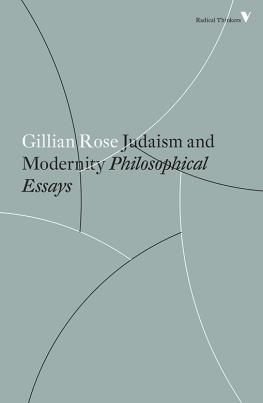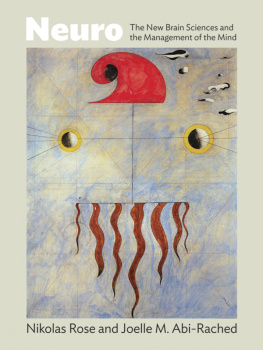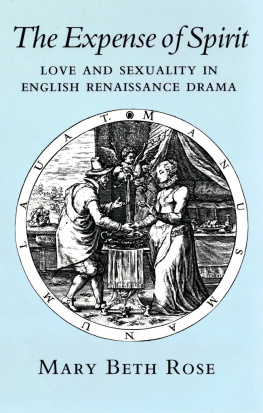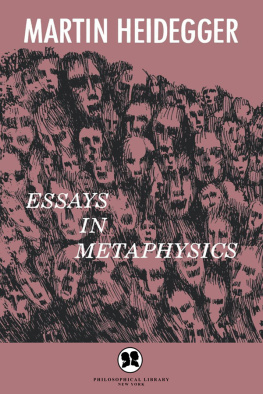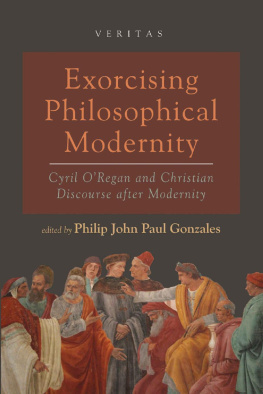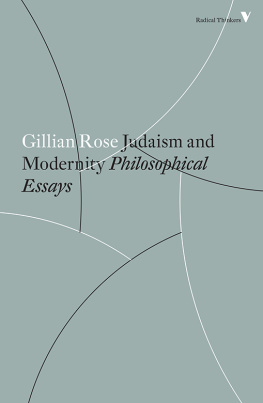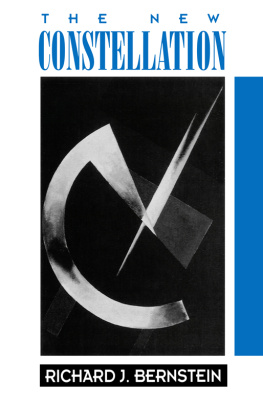Rose - Judaism and modernity: philosophical essays
Here you can read online Rose - Judaism and modernity: philosophical essays full text of the book (entire story) in english for free. Download pdf and epub, get meaning, cover and reviews about this ebook. City: London, year: 2017, publisher: Verso Books, genre: Religion. Description of the work, (preface) as well as reviews are available. Best literature library LitArk.com created for fans of good reading and offers a wide selection of genres:
Romance novel
Science fiction
Adventure
Detective
Science
History
Home and family
Prose
Art
Politics
Computer
Non-fiction
Religion
Business
Children
Humor
Choose a favorite category and find really read worthwhile books. Enjoy immersion in the world of imagination, feel the emotions of the characters or learn something new for yourself, make an fascinating discovery.
Judaism and modernity: philosophical essays: summary, description and annotation
We offer to read an annotation, description, summary or preface (depends on what the author of the book "Judaism and modernity: philosophical essays" wrote himself). If you haven't found the necessary information about the book — write in the comments, we will try to find it.
Judaism and modernity: philosophical essays — read online for free the complete book (whole text) full work
Below is the text of the book, divided by pages. System saving the place of the last page read, allows you to conveniently read the book "Judaism and modernity: philosophical essays" online for free, without having to search again every time where you left off. Put a bookmark, and you can go to the page where you finished reading at any time.
Font size:
Interval:
Bookmark:

Philosophical Essays
GILLIAN ROSE

For Jay Bernstein
I wish you a long life
This edition published by Verso 2017
First published by Blackwell 1993
Gillian Rose 1993, 2017
All rights reserved
The moral rights of the author have been asserted
1 3 5 7 9 10 8 6 4 2
Verso
UK: 6 Meard Street, London W1F 0EG
US: 20 Jay Street, Suite 1010, Brooklyn, NY 11201
versobooks.com
Verso is the imprint of New Left Books
ISBN-13: 978-1-78663-088-9
ISBN-13: 978-1-78663-089-6 (UK EBK)
ISBN-13: 978-1-78663-090-2 (US EBK)
British Library Cataloguing in Publication Data
A catalogue record for this book is available from the British Library
The Library of Congress Has Cataloged the Previous Edition as Follows:
Rose, Gillian.
Judaism and modernity : philosophical essays / Gillian Rose.
p. cm.
Includes bibliographic references and index.
ISBN 0-631-16436-7. ISBN 0-631-18971-8 (pbk.)
1. Philosophy, Jewish. 2. Judaism20th century. 3. Jews
GermanyIntellectual life. 4. Holocaust, Jewish (19391945)
Influence. I. Title.
B5800.R67 1993
| 181.06dc20 | 9315056 CIP |
Printed in the US by Maple Press
A friend has suggested that I preface this book with an apologia pro vita sua along the lines in which Franz Rosenzweig tried to explain his return to Judaism in his letter to Friedrich Meinecke declining the offer of a university post. This apology from 1920 seems uncannily to converge with the growing tendency nowadays to present theoretical work with a declaration of ones personal as well as ones academic qualifications and interests: I write as a woman, as a Jew, and so on.
My trajectory displays no such logic. If I knew who or what I were, I would not write; I write out of those moments of anguish which are nameless and I am able to write only where the tradition can offer me a discipline, a means, to articulate and explore that anguish. Against the self-image of the age, it has been within the philosophical tradition, which for me includes social, political and religious thought, that I have found the resources for the exploration of this identity and lack of identity, this independence and dependence, this power and powerlessness. My difficulty is not addressed in any rejection of that tradition which would settle for only one side of my predicament: lack of identity, dependence, powerlessness, or any account of otherness which theorizes solely exclusion and control.
It is this speculative account of experience, which persists in acknowledging the predicament of identity and lack of identity, independence and dependence, power and powerlessness, that has led me to Judaism. Or, rather, it is by working through my difficulty in the ratio and the crises of modern philosophy that I discover myself in the middle of the ratio and crises of modern Judaism.
I have not arrived at Judaism as the sublime Other of modernity whether as the moment of divine excess from Kants third Critique, as the living but worldless community from Rosenzweig, as the devastating ethical commandment from Levinas, as trace and writing from deconstruction. Nor have I discovered Judaism waiting at the end of the end of philosophy, Judaism redivivus out of the ashes of the Holocaust: as the Jewish return into history for Fackenheim, as the issue of modernity for Bauman, and as the terrible essence of the West for Lacoue-Labarthe.
No. I write out of the discovery that both recent philosophy, in its turn to what I name new ethics, and modern Jewish philosophy, in its ethical self-presentations, are equally uncomfortable with any specific reflection on modern law and the state, which they assimilate to the untempered domination of Western metaphysics. Rome haunts the agon between Athens and Jerusalem, but only the imperial Roman eagle has been admitted, while the Rome which invented private property law, the law of persons, and separated it from citizenship is forgotten because it is so familiar. In the eagerness to eschew the metaphysics of subjectivity, recent philosophy and Jewish philosophy lose the means to discern the structuring of our anxiety, the modern mix of freedom and unfreedom in civil society and the state which continues to contour our subjectivity and which cannot be abjured. Having renounced teleological philosophy of history, general philosophy produces in its place the newly purified polarity of reason and ethics, which Jewish philosophy, scared of the charge of Pharisaical legalism, intensifies with its purified polarity of law and love. Philosophy and Judaism want to proclaim a New Testament which will dispose of the broken promises of modernity.
I write out of the violence infecting these philosophical purifications which ignore their own preconditions and outcomes. I write out of the feigned innocence of the and in Judaism and Modernity. This is my apologia pro vita sua: the only way I can approach my life is by attempting to explore how the difficulties with which I engage may articulate that life. The speculative method of engaging with the new purifications whenever they occur, in order to yield their structuring but unacknowledged third, involves deployment of the resources of reason and of its crisis, of identity and lack of identity. This results in what I call the facetious style the mix of severity and irony, with many facets and forms, which presents the discipline of the difficulty.
Since the essay form as well as the style corresponds to the method of speculative engagement, I have kept each essay self-contained at the cost of some repetition of argument. The first three essays (Is there a Jewish Philosophy? Ethics and Halacha, The Future of Auschwitz) deal with the difficulties of distinguishing Judaism and philosophy, Judaism and ethics, Judaism and the Holocaust. The second three essays (Shadow of Spirit, From Speculative to Dialectical Thinking Hegel and Adorno, Of Derridas Spirit) develop the speculative method through engaging with post-modern theology, Adorno and Derrida. The seventh essay, on Nietzsches Judaica, examines the connection between Judaism and genealogy as a method in Nietzsches thinking. The following five essays on Cohen, Rosenzweig, Buber, Benjamin, Weil and Levinas engage with thinkers who are important equally as modern philosophers and as modern Jewish philosophers (in spite of Weils infamous distaste for Judaism). In each case, methodological innovation and the renewal of ethics are speculatively engaged with the account of modernity and modern law. The final two essays extend the same exploration to recent attempts by architectural theory to take account of Judaism and the Holocaust in architectural history.
In general and when trying to combat widespread misconceptions concerning Judaism, I assume no knowledge of Hebrew terms and I explain them every time they arise. For fundamental and frequently employed terms, such as, Torah, Talmud, Halacha, I have also included the briefest of glosses under the corresponding entries in the Index.
Once again I have had the benefit of much constructive criticism. I owe thanks to the following, who have made substantial comments on particular essays: Keith Ansell-Pearson, Robert Fine, Michael Marrus, Robert Jan van Pelt, Tony Thorlby and Richard Wolin. Jay Bernstein, Greg Bright, Howard Caygill and David Novak have looked over the whole endeavour with merciless and with generous eyes. This time Greg Brights cover affords facets of the difficulty of Judaism and modernity. Jim Beckfords works of supererogation have been lavishly drawn on. Iain Liddell has been equally proficient and munificent with computing services and with Classical Greek, while Barbara Gray has saved me at the eleventh hour with her more-than-customary graciousness. At Basil Blackwell, I would also like to thank my editor Stephan Chambers, for his good judgement and support, and also, especially, Andrew McNeillie and Marguerite Nesling for their perspicacity as well as sheer efficiency in preparing both this book and
Font size:
Interval:
Bookmark:
Similar books «Judaism and modernity: philosophical essays»
Look at similar books to Judaism and modernity: philosophical essays. We have selected literature similar in name and meaning in the hope of providing readers with more options to find new, interesting, not yet read works.
Discussion, reviews of the book Judaism and modernity: philosophical essays and just readers' own opinions. Leave your comments, write what you think about the work, its meaning or the main characters. Specify what exactly you liked and what you didn't like, and why you think so.

